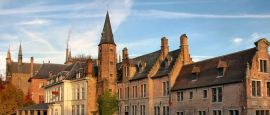Belgium Shopping and nightlife
Shopping in Belgium
Shopping in Belgium is a joy: from discount diamonds and forward-thinking fashion in Antwerp to antiques from Tongeren and perfumes forged in the vaults of Namur castle. Standard souvenirs are lace, chocolate and beer, but if you’re after something more original you could buy a cheeky bottle of jenever from Hasselt, artisan chocolate-dipped moon-shaped halve maantje biscuits from Diest, or a comic book (bandes dessinée) by a home-grown cartoon artist from Brussels.
Fashion lovers, both designer and vintage, should make Brussels and Antwerp a priority; beers are best bought from regional breweries, such as Cantillon in Brussels, rather than tourist shops; and chocolate lovers should find plenty of boutique shops in Bruges and Brussels.
Brussels’ most elegant shopping arcades are the 19th-century glass-vaulted Galeries Royales St-Hubert, Galerie Bortier and Passage du Nord, while high-street fashion shops congregate along Rue Neuve and designer labels can be found lining Avenue Louise. Antiques lovers will find pricey articles on show around the Sablon and cheaper items in the Marolles district.
Antwerp’s haute-couture fashion shops centre around Nationaalstraat and Lombardenvest; the high street stores line Meir, which is the arterial street linking the train station and the old city centre. If you’re shopping for diamonds, the Jewish district surrounding the station has wall-to-wall dealers.
Markets abound in Belgium, with most taking place in central squares at the weekend between 0700 and 1300. Perhaps the most famous are Brussels’ Marché aux Puces flea market held on Place du Jeu de Balle (www.marcheauxpuces.be) and the sprawling Marché du Midi food market held on Boulevard de l’Europe between 0700 and 1300 on Sunday.
Nightlife in Belgium
Belgium’s main cities − Brussels, Bruges, Ghent, Antwerp and Liège − offer a broad array of cultural pursuits, from international and local theatre and famous opera, to cosy ‘brown’ cafés, chic cocktail bars and inventive nightclubs. Things can be a little quieter outside the main towns, but you’ll always be able to find a port in the storm offering good beer and a warm welcome.
Brussels is a hot spot for jazz bars, try L'Archiduc (www.archiduc.net), and its Art Nouveau BOZAR (www.bozar.be) theatre complex and historical Théâtre de la Monnaie (www.lamonnaie.be) opera house shouldn’t be missed. Performances are available in Dutch, French and some English. In addition, the city has enough bars − cool or cosy − to allow you to drink in a different establishment every night for a year. Everything falls within the city centre and is within easy walking distance.
Ghent and Bruges are better-known for their historical drinking dens, with one or two nightclub options. Antwerp, on the other hand, has a lively club scene, including Belgium’s biggest nightclub Noxx (www.noxxantwerp.com), smarter cocktail bars and a handful of jazz dens too. Night-time revelry in Liège centres around the pedestrianised Le Carré district, which has numerous bars studded between the boutique shops.




 You know where
You know where